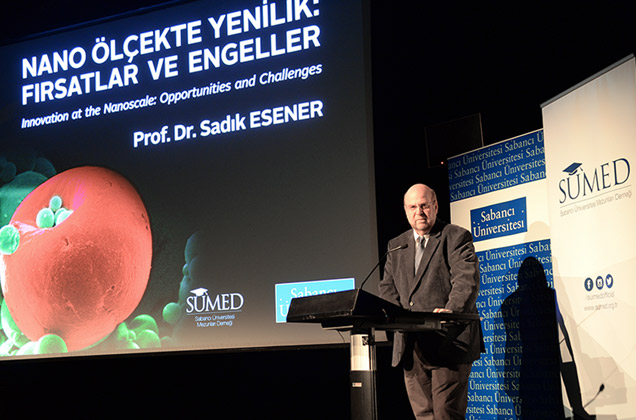28/03/2016
Professor Sadık Esener, a globally-recognized expert on cancer research, spoke on "Innovation at the Nanoscale: Opportunities and Challenges"
Sabancı University hosted a conference on "Innovation at the Nanoscale: Opportunities and Challenges".
The lecture by Professor Sadık Esener, one of the leading global experts on cancer research, took place on Monday, March 21 at the Sakıp Sabancı Museum - the Seed.
Recently chosen to direct the Oregon Health & Science University’s Knight Cancer Institute Center for Early Detection Research, Professor Sadık Esener is known as a pioneering and innovative scientist who sets new trends and changes the game in cancer research on an international level.

Sabancı University Board of Trustees Vice-Chair Professor Sadık Esener is considered among an extremely small number of individuals with the combination of skills, experience and passion to lead the new initiative.
Professor Sadık Esener's lecture on “Innovation at the Nanoscale: Opportunities and Challenges" expanded the horizon with regard to the fundamental principles of nanoscience and recent developments in nanomedicine as we witness innovative approaches in the use of nanotechnology to treat cancer and cardiovascular or neurological diseases. Esener also discussed sociopolitical challenges to nano-biotechnologies, and the commercial or technological opportunities these will create.
Professor Sadık Esener outlined the subject of his presentation: "My new task is to make a journey from the macro world to the nano world. How is life in the nano world? What does work look like? What more can we learn with regard to science? We start with a concept and we develop it to become marketable. One of the challenges that lie ahead is sustainability. This causes us concern in many different ways. We believe that water sources are dwindling. Healthcare is a great concern. One example is antibiotic-resistant diseases. Can nanoengineering help us overcome these challenges? Energy and personalized medicine are other concerns. Nano-medicine is a great example of what nanotechnology is capable of. Brain engineering will enable further forays into artificial intelligence. Meanwhile, 3D organ printing will bring about artificial life." Professor Esener discussed the great socio-economical issues caused by cancer and emphasized the huge impact this has on national economies.

Sabancı University Founding Board of Trustees Chair Güler Sabancı also spoke at the conference, saying “Professor Esener has a brilliant background that makes us proud. He has pioneered studies in nanomedicine and holds a large number of patents. In addition, he has published more than 450 scientific articles and is among the founders of many technology startups." Sabancı explained that Professor Esener never neglected higher education in his home country while undertaking scientific research all over the world, and made valuable contributions to research processes, enabling acceleration.
Güler Sabancı noted that Professor Sadık Esener has been an active member of the Sabancı University Board of Trustees since 2010, continuing, "Since 2014, Professor Esener is the Vice-Chair of our Board of Trustees - a position where he makes great contributions to our university." Güler Sabancı concluded, "I wish Sadık Esener success in his new position as the leader of Oregon Health & Science University’s Knight Cancer Institute Center for Early Detection Research and thank him for his exceptional contributions on behalf of Sabancı University and Turkey as a whole."

Sabancı University President Professor Nihat Berker also attended the "Innovation at the Nanoscale: Opportunities and Challenges" conference and the audience included students, alumni, academics and members of the scientific community.

About Professor Sadık Esener
Professor Sadık Esener has been a member of the Sabancı University Board of Trustees since 2010, and was appointed Vice-Chair of the Board of Trustees in 2014.
Professor Esener is the Founding Director of the Cancer Early Detection Research Institute and the Wendt Chair at the Knight Cancer Center, and a Professor of Biomedical Engineering at the Oregon Health and Sciences University. Professor Esener is on leave from his faculty position at the Departments of NanoEngineering and Electrical and Computer Engineering at the University of California, San Diego where he has served previously as the Founding Director and Principal Investigator of the NIH/NCI funded NanoTumor Center of Excellence for Cancer Nanotechnology, the director of DARPA-funded multi-university Center for Chips with Heterogenously Integrated Photonics, the 3D-Opto-Electronic Stacked Processors industry/university consortium, and the Fast Read-out Optical Storage (FROST) Industry consortium. His laboratory at UCSD has made many pioneering contributions to the fields of photonics, biophotonics, and nanomedicine. He is the inventor and co-inventor of many patents has authored more than 450 publications. Esener serves as the vice-chair of the Board of Trustees of Sabancı University, and is a Fellow of the Optical Society of America. Esener is a co-founder of UCSD’s department of NanoEngineering and the Institute of Engineering in Medicine at UCSD and of several San Diego-based start-ups including Nanogen (NGEN), Genoptix (GXDX), Ziva, Cellix, Sonrgy, Devacell and Trogenex Corporations.
About the Knight Cancer Institute
The OHSU Knight Cancer Institute is an international leader in cancer research and personalized cancer treatment. With the mission of ending cancer as we know it, the OHSU Knight Cancer Institute continues to build its scientific and clinical leadership and cancer treatment resources. Public support and private philanthropy – including a transformative $100 million gift from Nike Chairman Phil Knight and his wife Penny in 2008 – have provided crucial resources to advance our progress.
Institute Director Dr. Druker’s plans to advance the early detection of cancer beyond methods used today, so that it’s possible to catch and treat the biological triggers of the disease, inspires philanthropists to make donations to the Institute.
Knight Cancer is also attracting powerful research collaborations with technology leaders such as Intel Corporation and FEI Co., who want to be part of our mission.





